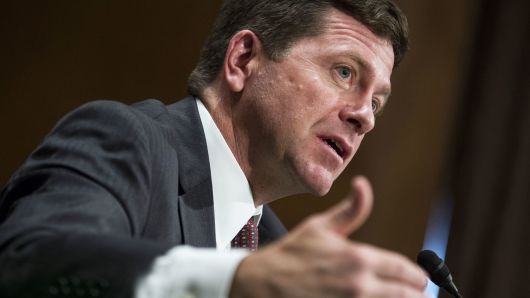SEC Chairman Jay Clayton gave clarity on the handling of cryptocurrency securities. More specifically, referring to his position regarding the claims of William Hinman that bitcoin and ethereum are potentially not securities.
The congressman asks to clarify the classification of cryptocurrency securities. Ted Budd asked the Securities Commission Chairman (SEC), Jay Clayton questions about cryptocurrency and its handling of securities.
In particular, he asked Clayton to clarify what criteria are used to determine when the offer and sale of cryptocurrency should be treated as “investment contracts” and, therefore, securities.
“The current uncertainty regarding the handling of offers and sales of digital tokens impedes innovation in the United States and will eventually do business elsewhere,” wrote Budd.
Budd also wondered if Clayton agreed with the analysis previously conducted by the Director of Corporate Finance William Hinman in his speech in June 2018. Finally, Budd asked if a cryptocurrency sold as part of an investment contract could later be considered unsafe if circumstances change.
SEC Chairman's Answer
In Clayton’s response, the chairman confirms some of the analysis done by Hinman, in particular, whether a cryptocurrency classified as secure can be considered unsafe later:
“I agree that analyzing whether a digital asset is being offered or sold as security is not static and does not strictly apply to the instrument. A digital asset may be offered and sold initially as collateral, since it meets the definition of an investment contract, but this designation may change over time if the digital asset is subsequently offered and sold in such a way that it will no longer meet this definition. ”
In addition, Clayton explains his position on decentralization and its role in the classification of securities:
“I agree with Director Hinman’s explanation about how a digital asset transaction can no longer be an investment contract if, for example, buyers no longer reasonably expect a person or group to perform basic managerial or entrepreneurial efforts. In these circumstances, a digital asset cannot constitute an investment contract under the Howey system. ”
Clayton's statements are a response to Hinman’s speech, where Hinman says that the definition of cryptocurrency securities may change over time and that the digital asset can no longer constitute a security offer if the network is “decentralized enough.”
In addition, Clayton’s statements provide additional clarity as to whether bitcoin, ethereum and other cryptocurrencies, such as XRP, are securities. For example, if ICO Ethereum was originally an investment contract (and, therefore, a security), then its coin may later be considered unsafe. The definitions of securities, according to Clayton, may change over time in accordance with Hinman's speech.
SEC Chairman clarifies the rules of securities regarding cryptocurrency
Clayton’s answer states that the definitions of cryptocurrency securities largely depend on the facts and circumstances of the transaction and that the definitions used for cryptocurrency do not differ from traditional securities:
“Regardless of the terminology used to identify a digital asset, it will depend on facts and circumstances, including the economic realities of the transaction.”
Another important factor to consider is the role of the SEC in protecting investors. To reduce fraud, Clayton seeks caution in patrolling cryptocurrency markets:
“I asked the department’s management to continue to actively monitor these markets and recommend coercive actions against those conducting ICOs or participating in other actions related to digital assets, in violation of federal securities laws.”
SEC actions are consistent with Clayton's statement. Since 2016, law enforcement has increased year after year, with major cases including the founder of EtherDelta, ICOs Paragon and Airfox, as well as DJ Khaled and Floyd Mayweather. As a result, those who do not comply with the rules in the United States should be careful:
“The commission acted quickly to stop allegedly fraudulent activities in this space, especially where illegal behavior was aimed at high street investors. Regardless of the prospects of technology, those who invest their hard-earned money in opportunities that fall under the federal securities laws deserve the full protection afforded by these laws. ”

